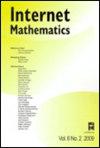Special Issue on Algorithms and Models for the Web Graph
Q3 Mathematics
引用次数: 0
Abstract
The 8th Workshop on Algorithms and Models for the Web Graph (WAW 2011) took place at Emory University in Atlanta, Georgia, May 27–29, 2011. This is an annual meeting, which is traditionally co-located with another, related, conference. WAW 2011 was co-located with the 15th International Conference on Random Structures and Algorithms (RSA 2011). Co-location of the workshop and conference provided opportunities for researchers in two different but interrelated areas to interact and to exchange research ideas. It was an effective venue for the dissemination of new results and for fostering research collaboration. The World Wide Web has become part of our everyday life, and information retrieval and data mining on the Web are now of enormous practical interest. The algorithms supporting these activities combine the view of the Web as a text repository and as a graph, induced in various ways by links among pages, hosts, and users. The aim of the workshop was to further the understanding of graphs that arise from the Web and various user activities on the Web, and to stimulate the development of high-performance algorithms and applications that exploit these graphs. The workshop gathered researchers who are working on graph-theoretic and algorithmic aspects of related complex networks, including citation networks, social networks, biological networks, molecular networks, and other networks arising from the Internet. This issue of Internet Mathematics includes a selection of papers that were presented at the workshop. The papers in this issue, unlike the conference proceedings of the workshop, do not have page limits and contain full versions of网络图的算法和模型特刊
2011年5月27日至29日,第八届网络图算法和模型研讨会(WAW 2011)在乔治亚州亚特兰大的埃默里大学举行。这是一个年度会议,传统上与另一个相关会议在同一地点举行。WAW 2011与第15届随机结构与算法国际会议(RSA 2011)同时召开。讲习班和会议在同一地点举行,为两个不同但相互关联的领域的研究人员提供了相互作用和交流研究思想的机会。它是传播新成果和促进研究合作的有效场所。万维网已经成为我们日常生活的一部分,网络上的信息检索和数据挖掘现在具有巨大的实际意义。支持这些活动的算法将Web视图组合为文本存储库和图形,通过页面、主机和用户之间的链接以各种方式诱导。研讨会的目的是进一步理解来自Web和Web上的各种用户活动的图,并促进开发利用这些图的高性能算法和应用程序。研讨会聚集了研究相关复杂网络的图论和算法方面的研究人员,包括引文网络、社会网络、生物网络、分子网络和其他来自互联网的网络。本期《互联网数学》收录了研讨会上发表的论文选集。与研讨会的会议论文集不同,本期的论文没有页数限制,并包含全文
本文章由计算机程序翻译,如有差异,请以英文原文为准。
求助全文
约1分钟内获得全文
求助全文

 求助内容:
求助内容: 应助结果提醒方式:
应助结果提醒方式:


